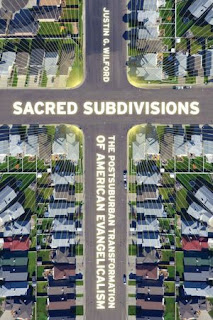 About the book, from the publisher:
About the book, from the publisher:In an era where church attendance has reached an all-time low, recent polling has shown that Americans are becoming less formally religious and more promiscuous in their religious commitments. Within both mainline and evangelical Christianity in America, it is common to hear of secularizing pressures and increasing competition from nonreligious sources. Yet there is a kind of religious institution that has enjoyed great popularity over the past thirty years: the evangelical megachurch. Evangelical megachurches not only continue to grow in number, but also in cultural, political, and economic influence. To appreciate their appeal is to understand not only how they are innovating, but more crucially, where their innovation is taking place.Learn more about the book and author at Justin G. Wilford's website.
In this groundbreaking and interdisciplinary study, Justin G. Wilford argues that the success of the megachurch is hinged upon its use of space: its location on the postsuburban fringe of large cities, its fragmented, dispersed structure, and its focus on individualized spaces of intimacy such as small group meetings in homes, which help to interpret suburban life as religiously meaningful and create a sense of belonging. Based on original fieldwork at Rick Warren’s Saddleback Church, one of the largest and most influential megachurches in America, Sacred Subdivisions explains how evangelical megachurches thrive by transforming mundane secular spaces into arenas of religious significance.
Justin G. Wilford has a PhD in cultural geography and an MA in political theory.
The Page 99 Test: Sacred Subdivisions.
--Marshal Zeringue





